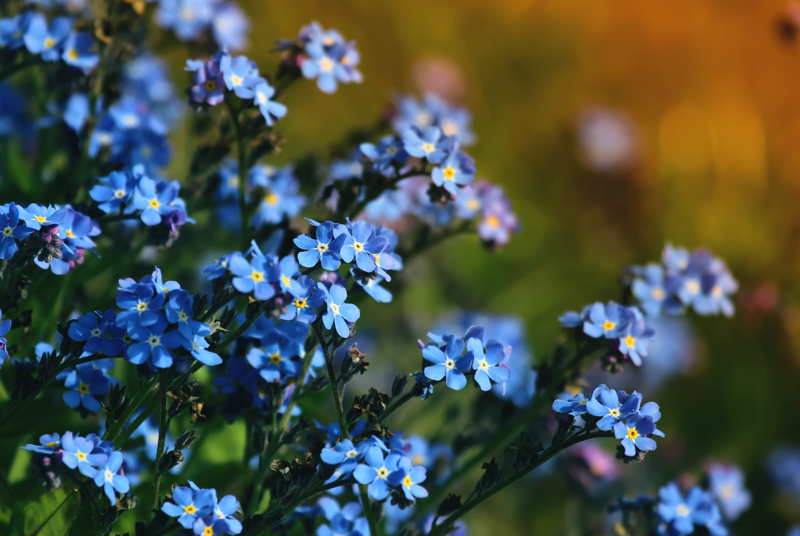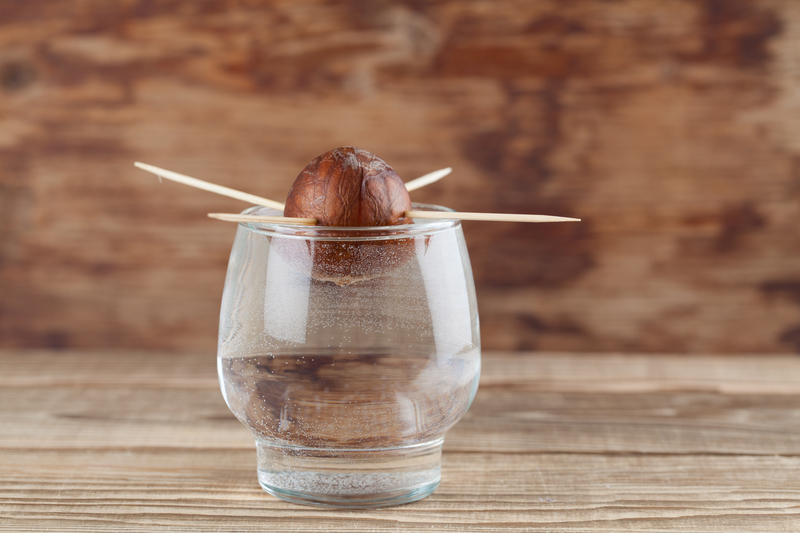Turning Leftovers into Nature's Richest Soil
Posted on 23/08/2025
Turning Leftovers into Nature's Richest Soil: A Comprehensive Guide to Home Composting
Did you know that the food scraps and organic waste you discard daily can be transformed into the richest soil on earth? Turning leftovers into compost not only reduces landfill waste but also nourishes your plants and gardens with powerful nutrients. If you're curious about how your kitchen scraps can become nature's black gold, this comprehensive guide will walk you through the process of composting, its benefits, methods, and everything you need to know to get started.

What is Compost and Why Is It Called Nature's Richest Soil?
Compost is the result of the natural decomposition of organic materials such as food scraps, leaves, and yard clippings. Through the magic of microbes, bacteria, and worms, these materials break down into a nutrient-rich, earthy substance that greatly enhances soil health. Compost is often nicknamed nature's richest soil or black gold because it improves soil structure, boosts plant growth, and increases resilience against pests and diseases.
The Benefits of Turning Leftovers into Rich Compost
- Reduces landfill waste: Food scraps make up over 30% of waste sent to landfills. Composting diverts this waste, lowering methane emissions and helping the environment.
- Enriches your garden: Compost returns essential nutrients to soil, supporting healthy plant growth and larger harvests.
- Improves soil texture: Adding compost creates soil that retains water better and encourages root development.
- Decreases need for chemical fertilizers: Compost acts as a natural fertilizer, reducing the dependency on harmful chemicals.
- Saves money: Compost is free to make and replaces the cost of commercial fertilizers and soil amendments.
Understanding the Composting Process
The journey from food scrap to nature's richest soil involves several stages. When you combine organic waste in the right proportions, microorganisms and macro-organisms (like worms and insects) get to work. Their activity, aided by moisture and oxygen, gradually transforms the pile into crumbly, sweet-smelling soil.
Key Ingredients for Effective Compost
- Greens (Nitrogen-rich materials): Fruit and vegetable scraps, coffee grounds, fresh grass clippings
- Browns (Carbon-rich materials): Dry leaves, shredded paper, straw, twigs, cardboard
- Water: Needed for decomposition; the pile should be moist like a wrung out sponge
- Oxygen: Necessary for aerobic decomposition; turning the pile provides air
Tip: Balance is crucial. Too much green material causes a smelly, soggy pile, while too many browns will slow down decomposition. A general rule is to use three parts browns to one part greens.
Methods of Transforming Kitchen Leftovers into Compost
Backyard Composting
The most popular method for turning leftovers into fertile soil is outdoor or backyard composting. You can create a compost pile or use a compost bin, depending on your available space and preference.
- Open Compost Pile: Start a heap in a shaded corner of your yard. Layer greens and browns and turn regularly to introduce oxygen.
- Compost Bin: Use a commercial or homemade bin to contain your compost pile and keep out pests. This method is tidier and easier to manage in smaller spaces.
Vermicomposting: Composting with Worms
If you live in an apartment or want faster results, vermicomposting is an excellent way to convert kitchen waste into nature's most valuable soil. Red wiggler worms eat through scraps and produce worm castings, a highly potent form of compost.
- Worm bins: Easy to set up indoors or on a balcony; requires bedding (shredded newspaper, cardboard), moisture, and a supply of food scraps.
- Benefits: Produces liquid "worm tea" for plants and compost in as little as 3-4 months.
Bokashi: Fermenting Food Waste
Bokashi is a Japanese method that uses beneficial microbes to ferment all types of leftovers, even meat and dairy, in an airtight bucket. The process produces pre-compost that can be buried in soil to finish decomposing.
- Ideal for urban dwellers: No odor, pest-proof, space-saving
- Quick results: Two weeks to ferment, then one month in soil
What Leftovers and Materials Can Go Into Compost?
Accepted Kitchen Leftovers
- Fruit and vegetable peelings
- Coffee grounds and paper filters
- Tea bags (verify they're plastic-free)
- Eggshells (crushed for faster breakdown)
- Bread, pasta, rice (in moderation; best for Bokashi or enclosed bins)
Common Yard Waste
- Grass clippings
- Dead leaves
- Twigs and small branches (shred for quicker breakdown)
- Non-diseased plant trimmings
Materials to Avoid in Home Compost
- Meat, fish, and dairy: Attract pests and cause odor except in Bokashi systems
- Oily foods and fats: Slow to decompose
- Pet waste: Risk of disease
- Weeds with seeds or invasive roots: Might regrow when you use your compost
- Treated wood or diseased plants: Can introduce harmful substances or pathogens
Step-by-Step Guide: How to Make Compost From Leftovers at Home
1. Choose Your Composting Location and Method
Decide whether to build a backyard pile, set up a bin, create a worm bin, or use Bokashi for your food scraps. Consider factors like climate, space, and waste volume.
2. Collect and Prepare Leftovers and Waste
- Keep a kitchen caddy or container for daily food scraps
- Shred larger pieces and crush eggshells to speed up decomposition
- Mix greens and browns before adding to your compost pile
3. Build the Compost Pile
- Start with a layer of browns like dry leaves or shredded paper
- Add a layer of greens such as food scraps or grass clippings
- Alternate layers, finishing with browns to deter pests
- Maintain moisture; the pile should feel damp but not soggy
4. Aerate and Monitor
- Turn the compost with a pitchfork or shovel every 1-2 weeks to introduce oxygen
- If the pile smells bad, add more browns; if dry, sprinkle with water
5. Harvest Your Finished Compost
- After a few months (or weeks in hot bins), compost should look dark, crumbly, and smell earthy
- Sift out larger pieces to return to the pile
- Use finished compost to mulch around plants, amend soil, or make potting mix
The Science: Why Composting Makes the Best Soil
Turning leftovers into soil rich in nutrients relies on the work of countless microorganisms, fungi, and macro-organisms. As they break down organic matter, they unlock minerals like nitrogen, phosphorus, and potassium, making them available to plants. Compost also improves the ability of soil to retain water, resist erosion, and host beneficial microbes.
Compost vs. Chemical Fertilizers
- Compost: Releases nutrients slowly, improves soil structure, feeds soil life
- Chemical fertilizers: Provide quick nutrient boost but degrade soil health and harm beneficial microbes over time
Advanced Tips for Creating Nutrient-Rich Compost
Maintain a Healthy Balance
- Too much nitrogen (greens) causes odor; add dry browns to fix
- Pile not breaking down? Add more greens, check moisture, or turn more frequently
Compost Activators
Certain materials speed up decomposition, such as aged manure, finished compost, or organic activator powders. Chopping waste into smaller pieces also accelerates the process.
Avoiding Composting Mistakes
- Pile is too wet: Add dry material and turn to aerate
- Pile is too dry: Moisten the pile and check for proper ratio of greens to browns
- Sour smell: Usually indicates poor aeration--turn the pile and add browns
Using Your Homemade Compost in the Garden
- Mix into garden beds before planting to boost soil nutrients
- Top-dress lawns and flower borders to add organic matter
- Mulch around shrubs, trees, or container plants to retain water and suppress weeds
- Make compost tea (soak compost in water and use the 'tea' for foliar feeding and watering)
Composting in the City: Practical Tips
Urban dwellers can still enjoy the benefits of turning leftovers into rich, fertile soil. If you lack outdoor space, try worm bins under your sink, Bokashi buckets, or look for community composting programs. Many cities even have compost drop-off points at farmers markets or urban gardens.
Starting a Neighborhood Compost Group
Gather neighbors to pool food scraps and yard waste, share bins or invest in community-scale tumblers. This is sustainable, social, and benefits everyone with nutritious compost!
Composting Myths Debunked
- "Compost piles always smell bad" - A well-balanced pile smells earthy, not putrid.
- "You can't compost in winter" - Decomposition slows but doesn't stop; insulated bins or indoor systems keep things active.
- "Composting is too much work" - With a rhythm in place, it's quick and easy to add scraps, turn the pile, and enjoy the black gold in your garden.

Conclusion: Join the Movement--Enrich the Earth, One Scrap at a Time
Transforming leftovers into nature's richest soil is rewarding, sustainable, and remarkably impactful. Whether you have a backyard, balcony, or small kitchen, there's a composting solution for every lifestyle. Not only does composting reduce waste and nourish your plants, but it also contributes to the global effort to protect our environment.
Start composting today and watch as the cycle of life continues--right from your plate to your garden, enriching nature every step of the way.
Frequently Asked Questions About Home Composting
- Q: How long does it take to turn food scraps into compost?
A: With the right mix and regular turning, you'll have mature compost in 2-6 months. Vermicomposting and hot composting can shorten this to as little as 2-3 months. - Q: Can I compost citrus peels and onions?
A: Yes, in moderation. Too many citrus peels can slow decomposition and make worm bins acidic--chop finely and balance with other scraps. - Q: Is it safe to use compost on vegetable gardens?
A: Absolutely! Finished compost is a superior, safe soil amendment--just ensure it's fully decomposed and doesn't contain harmful weeds or seeds.
Useful Resources and Further Reading
- EPA: Composting At Home
- Master Composter Guides (local extension offices)
- Community Composting Initiatives (search your local area or municipality)
Now is the perfect time to join the eco-friendly revolution: Turn your leftovers into nature's richest soil and help cultivate a greener earth for generations to come!
Latest Posts
Creating a Safe and Fun Outdoor Space for Kids
Create a safe and fun outdoor space for children in your garden
Breathe New Life into Your Overgrown Garden Today

